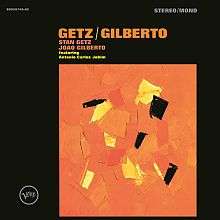Getz/Gilberto
| Getz/Gilberto | ||||
|---|---|---|---|---|
 | ||||
| Studio album by Stan Getz and João Gilberto featuring Antônio Carlos Jobim | ||||
| Released | April 1964[1] | |||
| Recorded | March 18–19, 1963 | |||
| Studio |
A&R Recording Studios New York City[2] | |||
| Genre | Jazz, bossa nova | |||
| Length |
34:02 (original LP) 39:16 (CD reissue) | |||
| Label | Verve | |||
| Producer | Creed Taylor | |||
| Stan Getz and João Gilberto featuring Antônio Carlos Jobim chronology | ||||
| ||||
 |
"The Girl from Ipanema"
Astrud Gilberto, along with João Gilberto and Stan Getz's "The Girl from Ipanema" from Getz/Gilberto |
| Problems playing this file? See media help. | |
Getz/Gilberto is a 1964 jazz-bossa nova album by American saxophonist Stan Getz and Brazilian guitarist João Gilberto, featuring composer and pianist Antônio Carlos Jobim. Its release helped fuel the bossa nova craze in the United States and internationally, becoming the first Grammy Award-winning album from non-American artists. It brought together Stan Getz, who had already performed the genre on his LP Jazz Samba, João Gilberto (one of the creators of the style), and Jobim, a celebrated Brazilian composer (and also one of the main creators of the genre), who wrote most of the songs in the album. It became one of the best-selling jazz albums of all time, and turned Astrud Gilberto, who sang on the tracks "The Girl from Ipanema" and "Corcovado", into an internationally celebrated musician. The painting on the cover is by Olga Albizu.
Reception
| Professional ratings | |
|---|---|
| Review scores | |
| Source | Rating |
| Allmusic | |
| The Rolling Stone Jazz Record Guide | |
It won the 1965 Grammy Awards for Best Album of the Year, Best Jazz Instrumental Album - Individual or Group and Best Engineered Album, Non-Classical. "The Girl from Ipanema" also won the award for Record of the Year in 1965. This was the first time a jazz album received Album of the Year. It was the only jazz album to win the award until Herbie Hancock's River: The Joni Letters 43 years later, in 2008.
JazzTimes (11/94, pp. 88–89) - "...essential for all serious jazz collections...served as proof that it is possible for music to be both artistically and commercially successful...this relatively sparse setting with the great Getz perfectly fit the music, resulting in a true gem..." Vibe (12/99, p. 158) - Included in Vibe's 100 Essential Albums of the 20th Century. In 2012, Rolling Stone ranked the album number 447 on its list of The 500 Greatest Albums of All Time.[5] It was listed by Rolling Stone Brazil as one of the 100 best Brazilian albums in history.[6] The album was inducted into the Latin Grammy Hall of Fame in 2001.[7]
The album was included in Robert Dimery's 1001 Albums You Must Hear Before You Die.[8]
Track listing
From the reissue/remaster CD, with some songs extended by up to 10 seconds.
| No. | Title | Songwriters | Length |
|---|---|---|---|
| 1. | "The Girl from Ipanema" | Antônio Carlos Jobim, Vinicius de Moraes, Norman Gimbel | 5:24 |
| 2. | "Doralice" | António Almeida, Dorival Caymmi | 2:46 |
| 3. | "Para Machucar Meu Coração" | Ary Barroso | 5:05 |
| 4. | "Desafinado" | Jobim, Newton Mendonça | 4:15 |
| 5. | "Corcovado (Quiet Nights of Quiet Stars)" | Jobim | 4:16 |
| 6. | "Só Danço Samba" | Jobim, de Moraes | 3:45 |
| 7. | "O Grande Amor" | Jobim, de Moraes | 5:27 |
| 8. | "Vivo Sónhando" | Jobim | 3:04 |
| 9. | "The Girl from Ipanema" (45 rpm issue) | Jobim, de Moraes, Gimbel | 2:54 |
| 10. | "Corcovado (Quiet Nights of Quiet Stars)" (45 rpm issue) | Jobim, Lees | 2:20 |
Total length: |
39:16 | ||
Tracks 9-10 not part of original LP. They are the single versions, released as bonus tracks on the CD reissue.
Personnel
- Stan Getz - tenor saxophone
- João Gilberto - guitar, vocals
- Antônio Carlos Jobim - piano
- Sebastião Neto - bass
- Milton Banana - drums
- Astrud Gilberto - vocals (in "The Girl from Ipanema", "Corcovado", "The Girl from Ipanema (45 rpm issue)" and "Corcovado (45 rpm issue)")
Reissues incorrectly list Tommy Williams as bassist,[9][10] and Dori Caymmi as composer of "Doralice".[11]
References
- ↑ Billboard Apr 25, 1964
- ↑ Simons, David (2004). Studio Stories - How the Great New York Records Were Made. San Francisco: Backbeat Books. Cf. especially, pp. 60–61.
- ↑ Allmusic review
- ↑ Swenson, J. (Editor) (1985). The Rolling Stone Jazz Record Guide. USA: Random House/Rolling Stone. p. 83. ISBN 0-394-72643-X.
- ↑ Wenner, Jann S., ed. (2012). Rolling Stone - Special Collectors Issue - The 500 Greatest Albums Of All Time. USA: Wenner Media Specials. ISBN 978-7-09-893419-6
- ↑ "Os 100 maiores discos da música brasileira" (in Portuguese). Umas Linhas. 2007-12-20. Retrieved 2009-04-20.
- ↑ "Latin GRAMMY Hall Of Fame". Latin Grammy Award. Latin Academy of Recording Arts & Sciences. 2001. Retrieved August 19, 2014.
- ↑ ^ Robert Dimery; Michael Lydon (23 March 2010). 1001 Albums You Must Hear Before You Die: Revised and Updated Edition. Universe. ISBN 978-0-7893-2074-2.
- ↑ Castro, Ruy, 1990. Chega de Saudade - A História e as histórias da bossa nova, São Paulo, Companhia das Letras, ISBN 85-7164-137-4 (Recording session photos showing bassist Sebastião Neto)
- ↑ (Liner notes by Arnaldo deSouteiro from a 2004 compilation, mentioning incorrect listing - PDF file)
- ↑ Dorival Caymmi